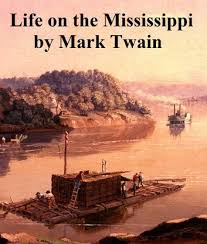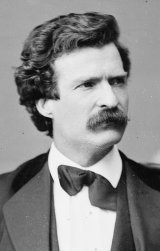Life on the Mississippi Page #2
Life on the Mississippi is a memoir by Mark Twain of his days as a steamboat pilot on the Mississippi River before the American Civil War. It is also a travel book, recounting his trip along the Mississippi River from St. Louis to New Orleans many years after the war.
In fact, all around, religion was in a peculiarly blooming condition: the Council of Trent was being called; the Spanish Inquisition was roasting, and racking, and burning, with a free hand; elsewhere on the continent the nations were being persuaded to holy living by the sword and fire; in England, Henry VIII. had suppressed the monasteries, burnt Fisher and another bishop or two, and was getting his English reformation and his harem effectively started. When De Soto stood on the banks of the Mississippi, it was still two years before Luther's death; eleven years before the burning of Servetus; thirty years before the St. Bartholomew slaughter; Rabelais was not yet published; 'Don Quixote' was not yet written; Shakespeare was not yet born; a hundred long years must still elapse before Englishmen would hear the name of Oliver Cromwell. Unquestionably the discovery of the Mississippi is a datable fact which considerably mellows and modifies the shiny newness of our country, and gives her a most respectable outside-aspect of rustiness and antiquity. De Soto merely glimpsed the river, then died and was buried in it by his priests and soldiers. One would expect the priests and the soldiers to multiply the river's dimensions by ten--the Spanish custom of the day--and thus move other adventurers to go at once and explore it. On the contrary, their narratives when they reached home, did not excite that amount of curiosity. The Mississippi was left unvisited by whites during a term of years which seems incredible in our energetic days. One may 'sense' the interval to his mind, after a fashion, by dividing it up in this way: After De Soto glimpsed the river, a fraction short of a quarter of a century elapsed, and then Shakespeare was born; lived a trifle more than half a century, then died; and when he had been in his grave considerably more than half a century, the second white man saw the Mississippi. In our day we don't allow a hundred and thirty years to elapse between glimpses of a marvel. If somebody should discover a creek in the county next to the one that the North Pole is in, Europe and America would start fifteen costly expeditions thither: one to explore the creek, and the other fourteen to hunt for each other. For more than a hundred and fifty years there had been white settlements on our Atlantic coasts. These people were in intimate communication with the Indians: in the south the Spaniards were robbing, slaughtering, enslaving and converting them; higher up, the English were trading beads and blankets to them for a consideration, and throwing in civilization and whiskey, 'for lagniappe;' and in Canada the French were schooling them in a rudimentary way, missionarying among them, and drawing whole populations of them at a time to Quebec, and later to Montreal, to buy furs of them. Necessarily, then, these various clusters of whites must have heard of the great river of the far west; and indeed, they did hear of it vaguely,--so vaguely and indefinitely, that its course, proportions, and locality were hardly even guessable. The mere mysteriousness of the matter ought to have fired curiosity and compelled exploration; but this did not occur. Apparently nobody happened to want such a river, nobody needed it, nobody was curious about it; so, for a century and a half the Mississippi remained out of the market and undisturbed. When De Soto found it, he was not hunting for a river, and had no present occasion for one; consequently he did not value it or even take any particular notice of it. But at last La Salle the Frenchman conceived the idea of seeking out that river and exploring it. It always happens that when a man seizes upon a neglected and important idea, people inflamed with the same notion crop up all around. It happened so in this instance. Naturally the question suggests itself, Why did these people want the river now when nobody had wanted it in the five preceding generations? Apparently it was because at this late day they thought they had discovered a way to make it useful; for it had come to be believed that the Mississippi emptied into the Gulf of California, and therefore afforded a short cut from Canada to China. Previously the supposition had been that it emptied into the Atlantic, or Sea of Virginia. CHAPTER 2 The River and Its Explorers LA SALLE himself sued for certain high privileges, and they were graciously accorded him by Louis XIV of inflated memory. Chief among them was the privilege to explore, far and wide, and build forts, and stake out continents, and hand the same over to the king, and pay the expenses himself; receiving, in return, some little advantages of one sort or another; among them the monopoly of buffalo hides. He spent several years and about all of his money, in making perilous and painful trips between Montreal and a fort which he had built on the Illinois, before he at last succeeded in getting his expedition in such a shape that he could strike for the Mississippi. And meantime other parties had had better fortune. In 1673 Joliet the merchant, and Marquette the priest, crossed the country and reached the banks of the Mississippi. They went by way of the Great Lakes; and from Green Bay, in canoes, by way of Fox River and the Wisconsin. Marquette had solemnly contracted, on the feast of the Immaculate Conception, that if the Virgin would permit him to discover the great river, he would name it Conception, in her honor. He kept his word. In that day, all explorers traveled with an outfit of priests. De Soto had twenty-four with him. La Salle had several, also. The expeditions were often out of meat, and scant of clothes, but they always had the furniture and other requisites for the mass; they were always prepared, as one of the quaint chroniclers of the time phrased it, to 'explain hell to the savages.'
Translation
Translate and read this book in other languages:
Select another language:
- - Select -
- 简体中文 (Chinese - Simplified)
- 繁體中文 (Chinese - Traditional)
- Español (Spanish)
- Esperanto (Esperanto)
- 日本語 (Japanese)
- Português (Portuguese)
- Deutsch (German)
- العربية (Arabic)
- Français (French)
- Русский (Russian)
- ಕನ್ನಡ (Kannada)
- 한국어 (Korean)
- עברית (Hebrew)
- Gaeilge (Irish)
- Українська (Ukrainian)
- اردو (Urdu)
- Magyar (Hungarian)
- मानक हिन्दी (Hindi)
- Indonesia (Indonesian)
- Italiano (Italian)
- தமிழ் (Tamil)
- Türkçe (Turkish)
- తెలుగు (Telugu)
- ภาษาไทย (Thai)
- Tiếng Việt (Vietnamese)
- Čeština (Czech)
- Polski (Polish)
- Bahasa Indonesia (Indonesian)
- Românește (Romanian)
- Nederlands (Dutch)
- Ελληνικά (Greek)
- Latinum (Latin)
- Svenska (Swedish)
- Dansk (Danish)
- Suomi (Finnish)
- فارسی (Persian)
- ייִדיש (Yiddish)
- հայերեն (Armenian)
- Norsk (Norwegian)
- English (English)
Citation
Use the citation below to add this book to your bibliography:
Style:MLAChicagoAPA
"Life on the Mississippi Books." Literature.com. STANDS4 LLC, 2025. Web. 6 Mar. 2025. <https://www.literature.com/book/life_on_the_mississippi_241>.








Discuss this Life on the Mississippi book with the community:
Report Comment
We're doing our best to make sure our content is useful, accurate and safe.
If by any chance you spot an inappropriate comment while navigating through our website please use this form to let us know, and we'll take care of it shortly.
Attachment
You need to be logged in to favorite.
Log In